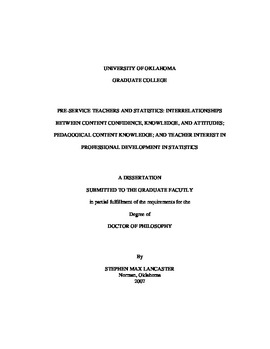| dc.contributor.advisor | McKnight, Curtis, | en_US |
| dc.contributor.advisor | Murphy, Teri, | en_US |
| dc.contributor.author | Lancaster, Stephen Max. | en_US |
| dc.date.accessioned | 2013-08-16T12:20:50Z | |
| dc.date.available | 2013-08-16T12:20:50Z | |
| dc.date.issued | 2007 | en_US |
| dc.identifier.uri | https://hdl.handle.net/11244/1226 | |
| dc.description.abstract | Instruments were used to gather data about the defined variables. Two preexisting statistics knowledge instruments were used as well as three pre-existing attitudes scales. One of the three attitudes scales measured two separate subcategories of attitudes. Two new instruments were constructed for the study. A short Likert-type instrument was designed to investigate participant attitudes toward continuing professional development in statistics. A grading project was developed to qualitatively investigate preservice teacher knowledge of statistics content as applied to teaching. | en_US |
| dc.description.abstract | These results are suggestive rather than conclusive. Future research should focus on preservice teacher self-efficacy to learn statistics in the future among other issues. More work must be done for preservice mathematics teacher educators to extensively utilize the results from this study. However, we now know more about the factors affecting preservice teacher attitudes toward statistics than we did before this study. | en_US |
| dc.description.abstract | There were other relevant results. Preservice primary teachers taking their first required (general introductory) mathematics course had significantly higher selfefficacy to use their current statistics knowledge than did other majors in the same general mathematics course. Preservice primary teachers taking their first required mathematics course had significantly higher self-efficacy to learn statistics in the future that preservice primary teachers who were taking their last (4th) required mathematics course. Yet preservice primary teachers finishing their last required mathematics course had significantly higher attitudes toward statistics as a field than did the participants from the first required mathematics course for preservice teachers. | en_US |
| dc.description.abstract | The purpose of this study was to identify key variables that exist during preservice teacher training and that could affect teacher interest in pursuing continuing professional development in statistics. A study of the current literature was conducted. This body of literature included the growing importance of statistics in the K-12 popular curriculum, the attitudes that undergraduate students tend to possess toward statistics as a subject to learn, the importance of beliefs and content knowledge for improved K-12 classroom learning, and the growing importance of continuing professional development to help improve teacher beliefs and content knowledge levels. An important result from the literature is past studies indicated that there is little correlation between teacher knowledge and teacher attitudes toward statistics. | en_US |
| dc.description.abstract | Results show that, for preservice teachers, many affective variables do not correlate with statistics knowledge levels. This corresponded to the existing literature. Yet there were moderate correlations between some of the affective variables, such as iattitudes toward statistics as a field, and the knowledge levels of preservice teacher groups in the study. A key to this new result was the inclusion of more specific attitude measures than previously used in studies. | en_US |
| dc.format.extent | x, 321 leaves : | en_US |
| dc.subject | Statistics Study and teaching. | en_US |
| dc.subject | Education, Teacher Training. | en_US |
| dc.subject | Statistics Study and teaching Public opinion. | en_US |
| dc.subject | Teachers Training of. | en_US |
| dc.subject | Education, Mathematics. | en_US |
| dc.subject | Student teachers Attitudes. | en_US |
| dc.subject | Statistics Public opinion. | en_US |
| dc.title | Pre-service teachers and statistics: Interrelationships between content confidence, knowledge, and attitudes; Pedagogical content knowledge; and teacher interest in professional development in statistics. | en_US |
| dc.type | Thesis | en_US |
| dc.thesis.degree | Ph.D. | en_US |
| dc.thesis.degreeDiscipline | Department of Mathematics | en_US |
| dc.note | Advisers: Curtis McKnight; Teri Murphy. | en_US |
| dc.note | Source: Dissertation Abstracts International, Volume: 68-05, Section: A, page: 1856. | en_US |
| ou.identifier | (UMI)AAI3264594 | en_US |
| ou.group | College of Arts and Sciences::Department of Mathematics | |
